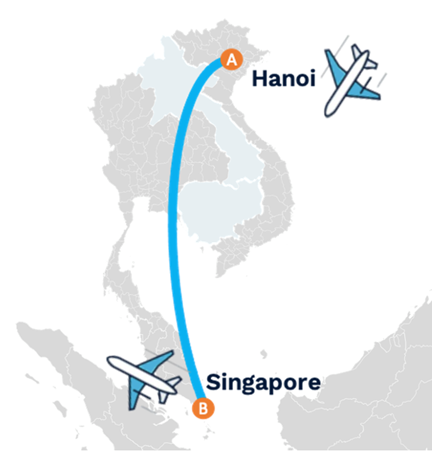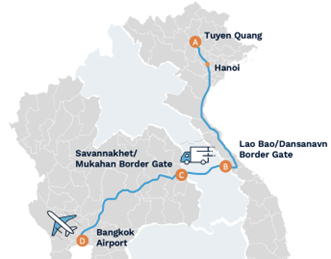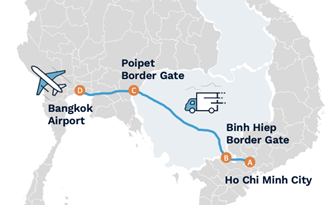As manufacturers move more and more of their production out of China, Vietnam is becoming the next manufacturing hub for East-to-West supply chains. Shippers new to the country must find effective solutions for shipping from Vietnam, taking into account how freight capacity and other factors will impact their ability to meet customer delivery requirements.
What is driving manufacturers out of China?
There are several factors that are leading manufacturers to move at least some of their production out of China:
- Dynamic Zero Covid Policy. The China government has announced in November 2022 to shorten the quarantine period from 7+3 to 5+3 while removing the restrictions on international passenger flights. This announcement led many to believe that the China borders will open soon in 2023. However, the government is still keen on imposing the dynamic zero covid policy to combat its local outbreaks which challenges both the local and international supply chain.
- US–China Trade War. The trade war that started during the Trump administration in 2018 is expected to continue. Some manufacturers are under pressure from customers to help them avoid the additional tariffs associated with a “made in China” label.
- Labor Costs. The rising cost of labor in China has changed supply chain economics for companies and many are evaluating alternate production hubs.
Vietnam as the first destination
For companies seeking to diversify manufacturing in Southeast Asia beyond just China (China + 1 strategy), there are several factors why Vietnam is often the first alternative they consider:
- Strategic location. Vietnam can easily manufacture and ship to any location, whether it’s to other Southeast Asian countries or to the West.
- Logistics Infrastructure. With a long coastline of over 3,200 km on the Pacific, several large seaports are stationed to accommodate shipping from Vietnam. The government has continued to invest in highways and seaports to make the country a more attractive destination.
- Labor cost. Vietnam’s labor costs are 50% cheaper than China’s, according to the Asia Experts Forum.
- Free Trade Agreements. Vietnam has signed a number of free trade agreements, such as the EU-Vietnam Free Trade Agreement (EVFTA), the UK-Vietnam Free Trade Agreement (UKVFTA), the Comprehensive and Progressive Agreement for Trans-Pacific Partnership (CPTPP) and the Regional Comprehensive Economic Partnership (RCEP). Some feel Vietnam may be one of the biggest beneficiaries of the RCEP, the world’s largest trade agreement.
- Major Hub for Electronics and Apparel. Vietnam is the second largest supplier of shoes and apparel to the US, with more than 200 manufacturing plants for Nike and Adidas alone. Big tech companies such as Apple have also relocated some production to Vietnam.
Northern Vietnam – connecting China to the West
Although manufacturers are moving to North Vietnam (Hanoi and Haiphong), China will still play a significant role in supplying raw materials from South China to these manufacturers. With a strategic location in Hanoi or Haiphong, raw materials can be easily and quickly transported and resupplied using cross-border trucking services from China, which can deliver in 1-2 days under normal conditions. The manufactured goods can then be shipped out to USA and Europe without the exporting challenges linked to China.
Shipping from Vietnam: multimodal options
As Vietnam gradually gains more of China’s manufacturing share, the demand for exporting finished goods from Vietnam will also increase. Shippers will begin looking for efficient and affordable freight options to ship from Vietnam. This is a challenge during peak season when tight freight capacity and rising rates can disrupt supply lines. To solve this, Vietnam freight forwarders like Dimerco can leverage multimodal transport to ensure a smooth, predictable flow of goods.
Air–Air Solution
 Hanoi – Singapore
Hanoi – Singapore
Let’s take Hanoi as an example. If sufficient outbound air freight is not available here, you can ship from Hanoi to Singapore, Southeast Asia’s biggest transit hub, to connect, via air, to just about anywhere in the world.
The total distance of 2,205 km can be covered within 1 day.
- Singapore Airport Free Trade Zone facilitates Air–Air transshipment handling
- Over 100 airlines ship out of SIN to worldwide destinations.
- Total transit time from origin to USA & EUR can be under 3–5 days.
Truck–Air Solutions
Hanoi – Bangkok Airport
 Not in a rush? Check if your Vietnam freight forwarder offers cross-border trucking services from Hanoi all the way to Bangkok, Thailand, where you can then choose your flight from Bangkok Airport for the next destination. Forwarders like Dimerco offer a multimodal freight solution that can also minimize your costs for shipping from Vietnam. The total distance of 1,700 km can be covered in 3–4 days.
Not in a rush? Check if your Vietnam freight forwarder offers cross-border trucking services from Hanoi all the way to Bangkok, Thailand, where you can then choose your flight from Bangkok Airport for the next destination. Forwarders like Dimerco offer a multimodal freight solution that can also minimize your costs for shipping from Vietnam. The total distance of 1,700 km can be covered in 3–4 days.
- Bangkok offers many more options than Hanoi for worldwide shipping.
- During peak season, Truck–Air service can address any air capacity challenges in Vietnam, while minimizing total transport cost.
- Total transit time from origin to USA & EUR can be under 7–8 days.
Ho Chi Minh City – Bangkok Airport
 Multimodal, cross-border trucking services are also offered from Ho Chi Minh City to Bangkok. The total distance of 850 km can be covered in 3–4 days.
Multimodal, cross-border trucking services are also offered from Ho Chi Minh City to Bangkok. The total distance of 850 km can be covered in 3–4 days.
- Bangkok provides many more worldwide shipping destinations than Ho Chi Minh City.
- During peak season, many shippers use the Truck–Air option to handle their important project shipments from Vietnam at a reasonable cost.
- Total transit time from origin to USA & EUR can be under 7–8 days.
Choosing a Vietnam freight forwarder to manage shipping from Vietnam
To manage shipping from Vietnam, it helps to have a freight forwarder with strong local knowledge, committed freight capacity from major Asia-based carriers, and flexible freight options. Dimerco’s global network of 150+ company-owned offices include Vietnam locations in Ho Chi Minh City, Hanoi, and Da Nang. Dimerco can combine air, ocean, contract logistics and customs brokerage services to create a customized supply chain solution to match your exact logistical needs.
Contact us to discuss how we can help connect your Asia-based operations with the world.